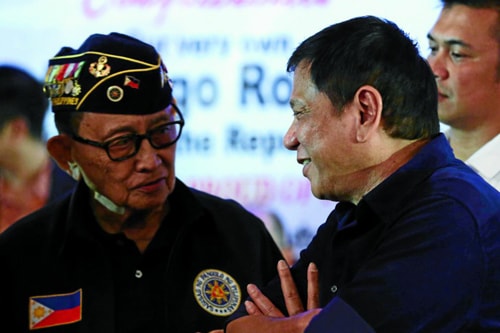Philippine expert: 'cow tongue line' ruling is not a magic pill
Despite winning the "cow tongue line" lawsuit, the Philippines is still applying a patient approach, hoping to discuss with China to help reduce tensions in the East Sea.
 |
| Former Philippine President Fidel Ramos, left, is the one who took responsibility for negotiating with China after the arbitration court's ruling. Photo: Inquirer |
The arbitral tribunal under Annex VII of the 1982 United Nations Convention on the Law of the Sea (UNCLOS) last month rejected China's nine-dash line in the East Sea, affirming that China has no legal basis to claim historical rights to resources within the "nine-dash line".
Mr. Bertrand Theodor Santos, an expert at the Institute for Maritime Affairs and Law of the Sea, University of the Philippines, said this is a "reminder" signal to Beijing about the country's prestige.
However, "a legal victory is not a magic pill to cure all diseases," Mr. Santos assessed when talking to VnExpress.
According to Mr. Santos, the Philippines is now showing a more "patient approach" towards China and even in relations with ASEAN countries.
"We hope all parties will see that abiding by international law is the best way to move discussions toward an acceptable solution," he said.
Amid concerns that the Philippines and China may "collude" to reach bilateral agreements that would negatively impact Vietnam, Philippine experts assert that this is unlikely to happen.
"I think Vietnam is still a partner of the Philippines in resolving the East Sea issue," he said.
Mr. Santos predicted that Manila would discuss less contentious issues with China with the aim of easing current tensions on the ground. These topics include fisheries cooperation, increased trade and investment, and marine conservation.
From the perspective of a country not involved in the dispute, Mr. Gerhard Will, an expert at the German Institute for International Politics and Security, refuted China's goodwill to cooperate in the East Sea.
"For nearly two decades, China has claimed that issues in the region can be resolved bilaterally. However, to date there is no evidence that Beijing can establish or implement any joint projects. On the contrary, the situation has only worsened," he said.
Commenting on the ruling of the Arbitral Tribunal, the German expert said he was not sure whether Beijing would consider this a "deadline" to demonstrate its desire to resolve the dispute satisfactorily and thereby make substantive commitments. Countries need to be optimistic but also realistic.
According to Mr. Will, Vietnam needs to discuss closely with the Philippines about the details of its bilateral discussions with China, and be vigilant about Beijing's "divide and rule" intentions.
“Bilateral discussions need to be conducted with the participation of the countries involved in the dispute in a closely coordinated manner,” he said.
Mr. Santos expressed concern about developments on the ground, saying it was unlikely that China would slow down its militarization activities.
"Building infrastructure for military purposes is very tempting for China to fulfill its goals in the East Sea," he stressed.
According to VNE
| RELATED NEWS |
|---|

